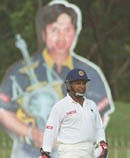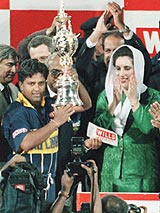'We will soon be losing to the smaller Test nations'
Arjuna Ranatunga led his country as a player and as a minister for tourism he is now fighting for its recovery from the Boxing Day tsunami
|
|

|
My father was a politician, but the main reason that I got involved was that the president invited me to join the government and give something back to the sport. I was elected as an MP for Colombo in the presidential elections and it was good to see that most of the cricket fans and public back home supported me. After that I was given a very important role as deputy minister of tourism. The president's brother is the minister, so I work under him.
When it comes to cricket issues I tend to stay away, because I'm not really happy with the people who run the sport. I have said this repeatedly to all the relevant people and brought the behaviour of Sri Lanka Cricket to the attention of parliament, who have held a two-hour debate on the subject. It's unfortunate that we've had to wait so long to get rid of these unwanted people, but I'm very glad the president and the minister have got involved and subpoenaed the cricket board.
We've been talking about this for so long, and everyone knows that that is the main reason why I contested the cricket board elections about a year back. I needed to show the public that whoever it is who comes in wouldn't have any chance of getting involved. A lot of people didn't believe that, so I wanted to prove a point. In some respects it was quite pleasing that I didn't get involved, because it showed the country and the entire world that cricket in Sri Lanka is run by one particular group that can't be trusted.
Yes, that is exactly what our ministerial group is working on at present, to get tourism in Sri Lanka back on its feet. The industry is the country's fourth-biggest money spinner and it has been affected more than other areas so it's a big task. But we're doing quite well, and by next season we hope to be back to normal trends.
Absolutely. It was very pleasing to see the ICC getting involved and raising funds for the affected countries. And there have been cricketers coming to Sri Lanka as well to help raise funds. This started with Shane Warne, who has been heavily involved in the southern area, and last week Ian Botham visited Galle, on the invitation of [Muttiah] Muralitharan. It's very pleasing.
When they are on the field they play hard and compete with each other, but when it comes to humanitarian work, it's great to see two great spinners getting together to help the Sri Lankan community.
I always thought that we should go back to Galle. It's a very lucky ground for Sri Lanka, and it's also one of the most picturesque venues in the world. I don't know why they wanted to shift away from the place, and I'm sure there's been a lot of undercurrent going on, but it's a lovely place to play cricket. The government will get consensus on this and I'm sure we'll get back to the place.
There's a lot more goings-on with this venue as well. The thing is, Murali comes from Kandy, and he was very keen to build a ground there and expected a lot of investment from the players. But the people who run cricket didn't want it to happen, because if Murali had managed to build it for less than has been spent in Dambulla, the entire story of their corruption could have come out. They've started building the new stadium, but construction has got stuck because the people who have come to power have stalled the development.
I don't agree. There are so many other places where a new stadium could have been located. The simple truth is that someone wants to create a name for himself. I'm not saying that we shouldn't have more grounds, but with the amount of money spent on Dambulla, there could have been another four grounds built in the north and east. The money has simply gone into people's back pockets, but I don't think we can get rid of Dambulla. Given the amount of money that has been spent there, we have to use it. But if we want to see a profit there, I tell you honestly it will take 100 years for that to happen, and that is the opinion of top accountancy firms.
Absolutely. Murali is already employed as a tourism ambassador, and I hope to implement a new scheme very soon, which will involve cricketers in England and other countries working for Sri Lanka's tourism industry. I'll be putting it to my minister and hopefully I'll get approval from the cabinet.
We used to get a lot of fast bowlers from the north and east, but this has happened less recently because of the problems. In terms of tourism, the peace talks are about to start up in the north, so these are the areas where we hope to do most of our promotion work, because they haven't been targeted in the last 15-20 years. The southern beaches and hotels have been damaged by the tsunami, and though I'm sure they will bounce back, in the meantime we have to concentrate on our other assets. There are some lovely beaches to the north, and further inland we can boast eight world heritage sites and so many other beautiful historical places.
I don't think so. If we can get Galle back up and running and sort out the issues in Kandy and Dambulla, then we will have three good venues in addition to those in Colombo. We are a small country compared to others, so the most important thing is invest in our infrastructure, and develop the game at school and club level rather than spend lots of money on new cricket grounds. My major concern is development in schools. The way these people are currently running cricket, if they go on for another five years then we will soon be losing to one of the smaller Test nations. That's what I fear the most.
|
|

|
We've come really far and worked really hard, but the current administration hasn't done enough. Other countries are improving day by day and we need to maintain our competitiveness. But it doesn't look too good for the future. Our junior teams are losing to younger nations, and if you take out Murali, Vaas, Jayasuyira and Atapattu, who played in the 1996 World Cup, there's not a whole lot left. Jayawardene, Arnold and Sangakkara were being groomed as their successors while I was still captain, and it's unfortunate that we don't have enough good young cricketers to back them up. Our structure is not good enough. We spend money on unwanted things, not infrastructure.
I think Atapattu will be around for a fairly long time. He's intelligent and hasn't done too badly. After him, it'll be between Mahela [Jayawardene] and Sangakkara, both of whom are captaining clubs, and Thilan Samaraweera, who's done well as a captain and allrounder. Those three will have to carry the burden over the next ten years, because I'm not sure if we are producing enough cricketers for international level. I find the situation a little bleak.
Well, there were two moments. The World Cup victory was both the best thing and the worst thing, because it was after our victory that all these unwanted people began getting involved. Beforehand, it had been difficult to find people for the cricket board, but afterwards the money started flooding in, and everyone wanted to get involved, make a name for themselves and be identified through cricket. My other favourite moment was beating England in England in 1998. That had always been my ambition, although it would have been even sweeter to achieve the victory at Lord's. Even so, to win at The Oval was a great achievement.
Yes, to a certain extent. We didn't do well against the counties, but we played well in our one-off Test match and I felt we should have had a chance to play in a three-Test series long before we did. Personally, I feel you need three Tests in a series, regardless of which side is touring. Otherwise, a side can win an entire series on the back of three or four good days. It's unfair on the team that doesn't have time to fight back.
I don't agree with reducing anyone's Test status, but it is very important to identify proper sides, otherwise the game will be reduced to a joke. The ICC need to be on their toes. They mustn't rush to give Test status to everyone - a side has to earn it by doing well over a good length of time.
I think there needs to be a call for consistency. A normal human being's eyesight cannot judge a bent arm. I'm pleased we now have a rule, but I'm not sure all the match referees are being consistent on this. When a player does something wrong, they can expect to be punished, either through a suspension or a fine. It should be the same for referees, because they are also professionals doing a job but they have the power to ruin an entire cricketer's life. Some of them are trying to be too smart. If someone is considered to have a problem, it's important for the referee to speak to the local body and the ICC behind closed doors without involving the media. Otherwise they can create the wrong impression of one or two players. Cricketers' lives can be ruined.
Absolutely. I admit I created havoc in that cricket match, but it's just unfortunate we had to face the music like that. These days, umpires and match referees have their rules laid down by the ICC, and this has meant no bowler has been called for throwing in the last two to three years. Consistency is the most important thing.
The civil war has been a 20-year problem, but we're still doing pretty well. As for the tsunami, that might have had a small effect, but we don't want to think about that anymore. At present our tourist levels are down by only 5%, so by October, November and December, we will be back to full strength for sure.
Andrew Miller is assistant editor of Cricinfo